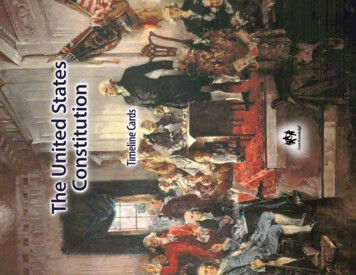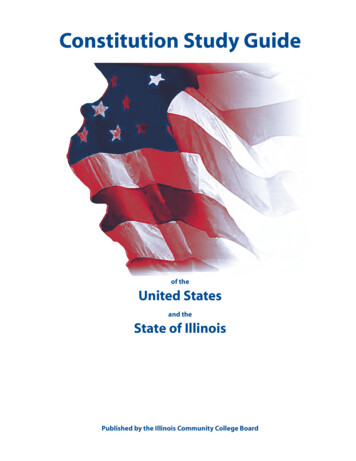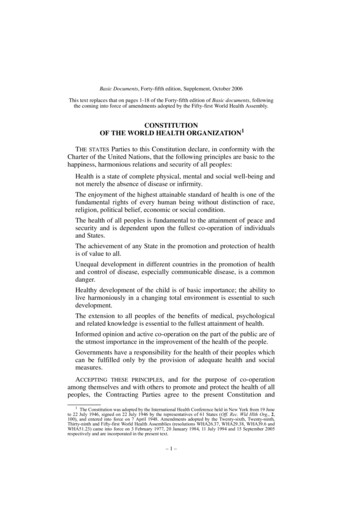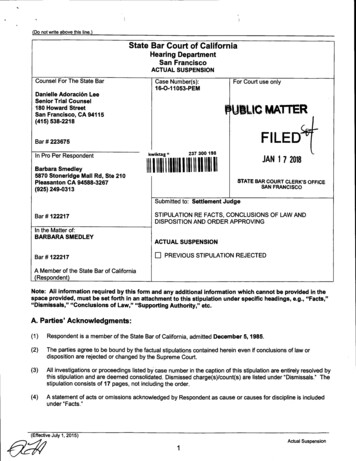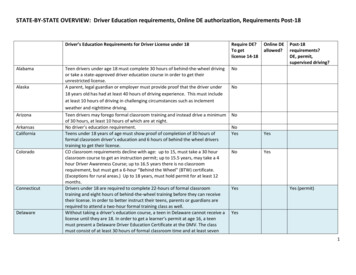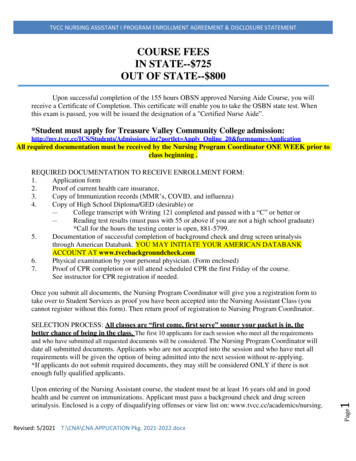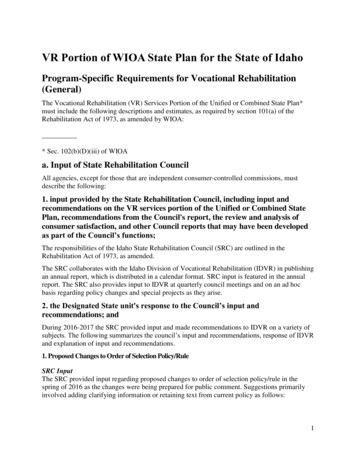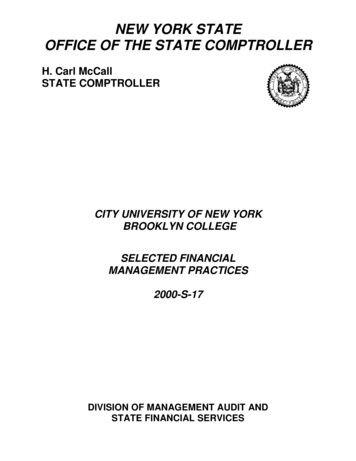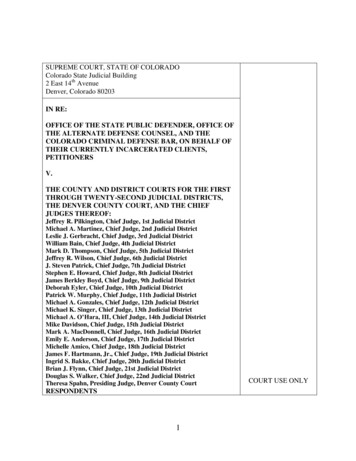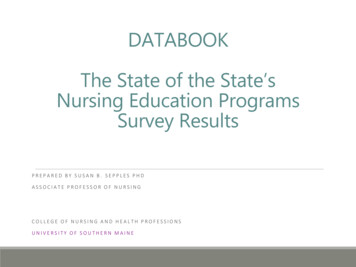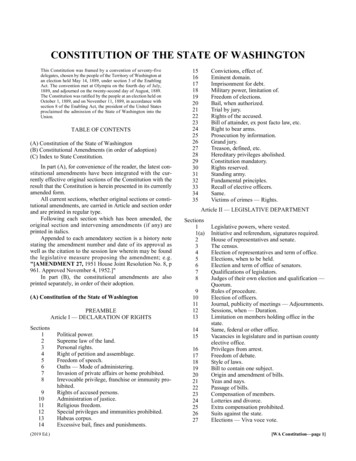
Transcription
CONSTITUTION OF THE STATE OF WASHINGTONThis Constitution was framed by a convention of seventy-fivedelegates, chosen by the people of the Territory of Washington atan election held May 14, 1889, under section 3 of the EnablingAct. The convention met at Olympia on the fourth day of July,1889, and adjourned on the twenty-second day of August, 1889.The Constitution was ratified by the people at an election held onOctober 1, 1889, and on November 11, 1889, in accordance withsection 8 of the Enabling Act, the president of the United Statesproclaimed the admission of the State of Washington into theUnion.TABLE OF CONTENTS(A) Constitution of the State of Washington(B) Constitutional Amendments (in order of adoption)(C) Index to State Constitution.In part (A), for convenience of the reader, the latest constitutional amendments have been integrated with the currently effective original sections of the Constitution with theresult that the Constitution is herein presented in its currentlyamended form.All current sections, whether original sections or constitutional amendments, are carried in Article and section orderand are printed in regular type.Following each section which has been amended, theoriginal section and intervening amendments (if any) areprinted in italics.Appended to each amendatory section is a history notestating the amendment number and date of its approval aswell as the citation to the session law wherein may be foundthe legislative measure proposing the amendment; e.g."[AMENDMENT 27, 1951 House Joint Resolution No. 8, p961. Approved November 4, 1952.]"In part (B), the constitutional amendments are alsoprinted separately, in order of their adoption.(A) Constitution of the State of WashingtonPREAMBLEArticle I — DECLARATION OF RIGHTSSections1234567891011121314(2019 Ed.)Political power.Supreme law of the land.Personal rights.Right of petition and assemblage.Freedom of speech.Oaths — Mode of administering.Invasion of private affairs or home prohibited.Irrevocable privilege, franchise or immunity prohibited.Rights of accused persons.Administration of justice.Religious freedom.Special privileges and immunities prohibited.Habeas corpus.Excessive bail, fines and 3435Convictions, effect of.Eminent domain.Imprisonment for debt.Military power, limitation of.Freedom of elections.Bail, when authorized.Trial by jury.Rights of the accused.Bill of attainder, ex post facto law, etc.Right to bear arms.Prosecution by information.Grand jury.Treason, defined, etc.Hereditary privileges abolished.Constitution mandatory.Rights reserved.Standing army.Fundamental principles.Recall of elective officers.Same.Victims of crimes — Rights.Article II — LEGISLATIVE 92021222324252627Legislative powers, where vested.Initiative and referendum, signatures required.House of representatives and senate.The census.Election of representatives and term of office.Elections, when to be held.Election and term of office of senators.Qualifications of legislators.Judges of their own election and qualification —Quorum.Rules of procedure.Election of officers.Journal, publicity of meetings — Adjournments.Sessions, when — Duration.Limitation on members holding office in thestate.Same, federal or other office.Vacancies in legislature and in partisan countyelective office.Privileges from arrest.Freedom of debate.Style of laws.Bill to contain one subject.Origin and amendment of bills.Yeas and nays.Passage of bills.Compensation of members.Lotteries and divorce.Extra compensation prohibited.Suits against the state.Elections — Viva voce vote.[WA Constitution—page 1]
28293031323334353637383940414243Special legislation.Convict labor.Bribery or corrupt solicitation.Laws, when to take effect.Laws, how signed.Alien ownership.Bureau of statistics, agriculture and immigration.Protection of employees.When bills must be introduced.Revision or amendment.Limitation on amendments.Free transportation to public officer prohibited.Highway funds.Laws, effective date, initiative, referendum —Amendment or repeal.Governmental continuity during emergency periods.Redistricting.Article III — THE 22232425Executive department.Governor, term of office.Other executive officers, terms of office.Returns of elections, canvass, etc.General duties of governor.Messages.Extra legislative sessions.Commander-in-chief.Pardoning power.Vacancy in office of governor.Remission of fines and forfeitures.Veto powers.Vacancy in appointive office.Salary.Commissions, how issued.Lieutenant governor, duties and salary.Secretary of state, duties and salary.Seal.State treasurer, duties and salary.State auditor, duties and salary.Attorney general, duties and salary.Superintendent of public instruction, duties andsalary.Commissioner of public lands — Compensation.Records, where kept, etc.Qualifications, compensation, offices which maybe abolished.Article IV — THE JUDICIARYSections122(a)33(a)45Judicial power, where vested.Supreme court.Temporary performance of judicial duties.Election and terms of supreme court judges.Retirement of supreme court and superior courtjudges.Jurisdiction.Superior court — Election of judges, terms of,etc.[WA Constitution—page Jurisdiction of superior courts.Exchange of judges — Judge pro tempore.Absence of judicial officer.Removal of judges, attorney general, etc.Justices of the peace.Courts of record.Inferior courts.Salaries of judicial officers — How paid, etc.Salaries of supreme and superior court judges.Ineligibility of judges.Charging juries.Eligibility of judges.Supreme court reporter.Judges may not practice law.Decisions, when to be made.Publication of opinions.Clerk of the supreme court.Court commissioners.Rules for superior courts.Reports of superior court judges.Clerk of the superior court.Style of process.Oath of judges.Election of superior court judges.Court of appeals.Commission on judicial conduct.Article V — IMPEACHMENTSections123Impeachment — Power of and procedure.Officers liable to.Removal from office.Article VI — ELECTIONS AND ELECTIVE RIGHTSSections11A2345678Qualifications of electors.Voter qualifications for presidential elections.School elections — Franchise, how extended.Who disqualified.Residence, contingencies affecting.Voter — When privileged from arrest.Ballot.Registration.Elections, time of holding.Article VII — REVENUE AND TAXATIONSections1234567891011Taxation.Limitation on levies.Taxation of federal agencies and property.No surrender of power or suspension of tax oncorporate property.Taxes, how levied.Taxes, how paid.Annual statement.Tax to cover deficiencies.Special assessments or taxation for localimprovements.Retired persons property tax exemption.Taxation based on actual use.(2019 Ed.)
12Budget stabilization account.Article VIII — STATE, COUNTY, ANDMUNICIPAL INDEBTEDNESSSections1234567891011State debt.Powers extended in certain cases.Special indebtedness, how authorized.Moneys disbursed only by appropriations.Credit not to be loaned.Limitations upon municipal indebtedness.Credit not to be loaned.Port expenditures — Industrial development —Promotion.State building authority.Energy, water, or stormwater or sewer servicesconservation assistance.Agricultural commodity assessments — Development, promotion, and hosting.Article IX — EDUCATIONSections12345Preamble.Public school system.Funds for support.Sectarian control or influence prohibited.Loss of permanent fund to become state debt.Article X — MILITIASections123456Who liable to military duty.Organization — Discipline — Officers — Powerto call out.Soldiers' home.Public arms.Privilege from arrest.Exemption from military duty.Article XI — COUNTY, CITY, ANDTOWNSHIP ORGANIZATIONSections12345678910111213141516(2019 Ed.)Existing counties recognized.County seats — Location and removal.New counties.County government and township organization.County government.Vacancies in township, precinct or road districtoffice.Tenure of office limited to two terms.Salaries and limitations affecting.State taxes not to be released or commuted.Incorporation of municipalities.Police and sanitary regulations.Assessment and collection of taxes in municipalities.Private property, when may be taken for publicdebt.Private use of public funds prohibited.Deposit of public funds.Combined city-county.Article XII — CORPORATIONSOTHER THAN 22Corporations, how formed.Existing charters.Existing charters not to be extended nor forfeitureremitted.Liability of stockholders.Term "corporation," defined — Right to sue andbe sued.Limitations upon issuance of stock.Foreign corporations.Alienation of franchise not to release liabilities.State not to loan its credit or subscribe for stock.Eminent domain affecting.Stockholder liability.Receiving deposits by bank after insolvency.Common carriers, regulation of.Prohibition against combinations by carriers.Prohibition against discriminating charges.Prohibition against consolidating of competinglines.Rolling stock, personalty for purpose of taxation.Rates for transportation.Telegraph and telephone companies.Prohibition against free transportation for publicofficers.Express companies.Monopolies and trusts.Article XIII — STATE INSTITUTIONSSections1Educational, reformatory, and penal institutions.Article XIV — SEAT OF GOVERNMENTSections123State capital, location of.Change of state capital.Restrictions on appropriations for capitol buildings.Article XV — HARBORS AND TIDE WATERSSections123Harbor line commission and restraint on disposition.Leasing and maintenance of wharves, docks, etc.Extension of streets over tide lands.Article XVI — SCHOOL AND GRANTED LANDSSections123456Disposition of.Manner and terms of sale.Limitations on sales.How much may be offered in certain cases —Platting of.Investment of permanent common school fund.Investment of higher education permanent funds.[WA Constitution—page 3]
PreambleArticle XVII — TIDE LANDSSections12Declaration of state ownership.Disclaimer of certain lands.Article XVIII — STATE SEALSections1Seal of the state.Article XIX — EXEMPTIONSSections113141516171819Article XXVIII — COMPENSATION OFSTATE OFFICERSSections1Board of health and bureau of vital statistics.Regulations concerning medicine, surgery andpharmacy.Article XXI — WATER AND WATER RIGHTSSections1Election contests for superior judges, howdecided.Representation in congress.Duration of term of certain officers.Election on adoption of Constitution, how to beconducted.When Constitution to take effect.Separate articles.Ballot.Appropriation.Exemptions — Homesteads, etc.Article XX — PUBLIC HEALTH ANDVITAL STATISTICSSections1212Article XXIX — INVESTMENTS OF PUBLICPENSION AND RETIREMENT FUNDSSections1Public use of water.Senatorial apportionment.Apportionment of representatives.Sections1How made.Constitutional conventions.Submission to the people.Article XXIV — BOUNDARIESSections1State boundaries.Article XXV — JURISDICTIONSections1Authority of the United States.Article XXVI — COMPACT WITH THEUNITED STATESArticle XXVII — SCHEDULESections1234567891011Existing rights, actions, and contracts saved.Laws in force continued.Debts, fines, etc., to inure to the state.Recognizances.Criminal prosecutions and penal actions.Retention of territorial officers.Constitutional officers, when elected.Change of courts — Transfer of causes.Seals of courts and municipalities.Probate court, transfer of.Duties of first legislature.[WA Constitution—page 4]Authorizing compensation increase during term.Article XXXI — SEX EQUALITY — RIGHTSAND RESPONSIBILITYArticle XXIII — AMENDMENTSSections123May be invested as authorized by law.Article XXX — COMPENSATION OFPUBLIC OFFICERSArticle XXII — LEGISLATIVE APPORTIONMENTSections12Salaries for legislators, elected state officials, andjudges — Independent commission — Referendum.Sections12Equality not denied because of sex.Enforcement power of legislature.Article XXXII — SPECIAL REVENUE FINANCINGSections1Special revenue financing.PreamblePREAMBLEWe, the people of the State of Washington, grateful tothe Supreme Ruler of the universe for our liberties, do ordainthis constitution.Article IARTICLE IDECLARATION OF RIGHTSArticle I Section 1SECTION 1 POLITICAL POWER. All politicalpower is inherent in the people, and governments derive theirjust powers from the consent of the governed, and are established to protect and maintain individual rights.Article I Section 2SECTION 2 SUPREME LAW OF THE LAND. TheConstitution of the United States is the supreme law of theland.(2019 Ed.)
Article I Section 14Article I Section 3SECTION 3 PERSONAL RIGHTS. No person shallbe deprived of life, liberty, or property, without due processof law.Article I Section 4SECTION 4 RIGHT OF PETITION AND ASSEMBLAGE. The right of petition and of the people peaceably toassemble for the common good shall never be abridged.Article I Section 5SECTION 5 FREEDOM OF SPEECH. Every personmay freely speak, write and publish on all subjects, beingresponsible for the abuse of that right.Article I Section 6SECTION 6 OATHS - MODE OF ADMINISTERING. The mode of administering an oath, or affirmation,shall be such as may be most consistent with and bindingupon the conscience of the person to whom such oath, oraffirmation, may be administered.Article I Section 7SECTION 7 INVASION OF PRIVATE AFFAIRSOR HOME PROHIBITED. No person shall be disturbed inhis private affairs, or his home invaded, without authority oflaw.Article I Section 8SECTION 8 IRREVOCABLE PRIVILEGE, FRANCHISE OR IMMUNITY PROHIBITED. No law grantingirrevocably any privilege, franchise or immunity, shall bepassed by the legislature.Article I Section 9SECTION 9 RIGHTS OF ACCUSED PERSONS. Noperson shall be compelled in any criminal case to give evidence against himself, or be twice put in jeopardy for thesame offense.Article I Section 10SECTION 10 ADMINISTRATION OF JUSTICE.Justice in all cases shall be administered openly, and withoutunnecessary delay.Article I Section 11SECTION 11 RELIGIOUS FREEDOM. Absolutefreedom of conscience in all matters of religious sentiment,belief and worship, shall be guaranteed to every individual,and no one shall be molested or disturbed in person or property on account of religion; but the liberty of consciencehereby secured shall not be so construed as to excuse acts oflicentiousness or justify practices inconsistent with the peaceand safety of the state. No public money or property shall beappropriated for or applied to any religious worship, exerciseor instruction, or the support of any religious establishment:PROVIDED, HOWEVER, That this article shall not be soconstrued as to forbid the employment by the state of a chaplain for such of the state custodial, correctional, and mentalinstitutions, or by a county's or public hospital district's hospital, health care facility, or hospice, as in the discretion ofthe legislature may seem justified. No religious qualificationshall be required for any public office or employment, norshall any person be incompetent as a witness or juror, in con(2019 Ed.)sequence of his opinion on matters of religion, nor be questioned in any court of justice touching his religious belief toaffect the weight of his testimony. [AMENDMENT 88,1993 House Joint Resolution No. 4200, p 3062. ApprovedNovember 2, 1993.]Amendment 34 (1957) — Art. 1 Section 11 RELIGIOUS FREEDOM — Absolute freedom of conscience in all matters of religious sentiment, belief and worship, shall be guaranteed to every individual, and no oneshall be molested or disturbed in person or property on account of religion;but the liberty of conscience hereby secured shall not be so construed as toexcuse acts of licentiousness or justify practices inconsistent with the peaceand safety of the state. No public money or property shall be appropriatedfor or applied to any religious worship, exercise or instruction, or the support of any religious establishment: Provided, however, That this articleshall not be so construed as to forbid the employment by the state of a chaplain for such of the state custodial, correctional and mental institutions as inthe discretion of the legislature may seem justified. No religious qualification shall be required for any public office or employment, nor shall any person be incompetent as a witness or juror, in consequence of his opinion onmatters of religion, nor be questioned in any court of justice touching hisreligious belief to affect the weight of his testimony. [AMENDMENT 34,1957 Senate Joint Resolution No. 14, p 1299. Approved November 4, 1958.]Amendment 4 (1904) — Art. 1 Section 11 RELIGIOUS FREEDOM— Absolute freedom of conscience in all matters of religious sentiment,belief and worship, shall be guaranteed to every individual, and no one shallbe molested or disturbed in person or property on account of religion; butthe liberty of conscience hereby secured shall not be so construed as toexcuse acts of licentiousness or justify practices inconsistent with the peaceand safety of the state. No public money or property shall be appropriatedfor or applied to any religious worship, exercise or instruction, or the support of any religious establishment. Provided, however, That this articleshall not be so construed as to forbid the employment by the state of a chaplain for the state penitentiary, and for such of the state reformatories as inthe discretion of the legislature may seem justified. No religious qualification shall be required for any public office or employment, nor shall any person be incompetent as a witness or juror, in consequence of his opinion onmatters of religion, nor be questioned in any court of justice touching hisreligious belief to affect the weight of his testimony. [AMENDMENT 4,1903 p 283 Section 1. Approved November, 1904.]Original text — Art. 1 Section 11 RELIGIOUS FREEDOM —Absolute freedom of conscience in all matters of religious sentiment, belief,and worship, shall be guaranteed to every individual, and no one shall bemolested or disturbed in person, or property, on account of religion; but theliberty of conscience hereby secured shall not be so construed as to excuseacts of licentiousness, or justify practices inconsistent with the peace andsafety of the state. No public money or property shall be appropriated for, orapplied to any religious worship, exercise or instruction, or the support ofany religious establishment. No religious qualification shall be required forany public office, or employment, nor shall any person be incompetent as awitness, or juror, in consequence of his opinion on matters of religion, norbe questioned in any court of justice touching his religious belief to affect theweight of his testimony.Article I Section 12SECTION 12 SPECIAL PRIVILEGES AND IMMUNITIES PROHIBITED. No law shall be passed granting toany citizen, class of citizens, or corporation other than municipal, privileges or immunities which upon the same termsshall not equally belong to all citizens, or corporations.Article I Section 13SECTION 13 HABEAS CORPUS. The privilege of thewrit of habeas corpus shall not be suspended, unless in caseof rebellion or invasion the public safety requires it.Article I Section 14SECTION 14 EXCESSIVE BAIL, FINES ANDPUNISHMENTS. Excessive bail shall not be required,excessive fines imposed, nor cruel punishment inflicted.[WA Constitution—page 5]
Article I Section 15Article I Section 15SECTION 15 CONVICTIONS, EFFECT OF. Noconviction shall work corruption of blood, nor forfeiture ofestate.Article I Section 16SECTION 16 EMINENT DOMAIN. Private propertyshall not be taken for private use, except for private ways ofnecessity, and for drains, flumes, or ditches on or across thelands of others for agricultural, domestic, or sanitary purposes. No private property shall be taken or damaged for public or private use without just compensation having been firstmade, or paid into court for the owner, and no right-of-wayshall be appropriated to the use of any corporation other thanmunicipal until full compensation therefor be first made inmoney, or ascertained and paid into court for the owner, irrespective of any benefit from any improvement proposed bysuch corporation, which compensation shall be ascertainedby a jury, unless a jury be waived, as in other civil cases incourts of record, in the manner prescribed by law. Wheneveran attempt is made to take private property for a use allegedto be public, the question whether the contemplated use bereally public shall be a judicial question, and determined assuch, without regard to any legislative assertion that the use ispublic: Provided, That the taking of private property by thestate for land reclamation and settlement purposes is herebydeclared to be for public use. [AMENDMENT 9, 1919 p 385Section 1. Approved November, 1920.]Original text — Art. 1 Section 16 EMINENT DOMAIN — Privateproperty shall not be taken for private use, except for private ways of necessity, and for drains, flumes or ditches on or across the lands of others foragricultural, domestic or sanitary purposes. No private property shall betaken or damaged for public or private use without just compensation havingfirst been made, or paid into court for the owner, and no right of way shallbe appropriated to the use of any corporation other than municipal, until fullcompensation therefor be first made in money, or ascertained and paid intothe court for the owner, irrespective of any benefit from any improvementproposed by such corporation, which compensation shall be ascertained bya jury, unless a jury be waived as in other civil cases in courts of record, inthe manner prescribed by law. Whenever an attempt is made to take privateproperty for a use alleged to be public, the question whether the contemplated use be really public shall be a judicial question, and determined assuch without regard to any legislative assertion that the use is public.Article I Section 17SECTION 17 IMPRISONMENT FOR DEBT. Thereshall be no imprisonment for debt, except in cases ofabsconding debtors.Article I Section 18SECTION 18 MILITARY POWER, LIMITATIONOF. The military shall be in strict subordination to the civilpower.Article I Section 19SECTION 19 FREEDOM OF ELECTIONS. AllElections shall be free and equal, and no power, civil or military, shall at any time interfere to prevent the free exercise ofthe right of suffrage.Article I Section 20SECTION 20 BAIL, WHEN AUTHORIZED. All persons charged with crime shall be bailable by sufficient sureties, except for capital offenses when the proof is evident, orthe presumption great. Bail may be denied for offenses punishable by the possibility of life in prison upon a showing by[WA Constitution—page 6]clear and convincing evidence of a propensity for violencethat creates a substantial likelihood of danger to the community or any persons, subject to such limitations as shall bedetermined by the legislature. [AMENDMENT 104, 2010Engrossed Substitute House Joint Resolution No. 4220, p3129. Approved November 2, 2010.]Original text — Art. 1 Section 20 BAIL, WHEN AUTHORIZED —All persons charged with crime shall be bailable by sufficient sureties,except for capital offenses when the proof is evident, or the presumptiongreat.Article I Section 21SECTION 21 TRIAL BY JURY. The right of trial byjury shall remain inviolate, but the legislature may providefor a jury of any number less than twelve in courts not ofrecord, and for a verdict by nine or more jurors in civil casesin any court of record, and for waiving of the jury in civilcases where the consent of the parties interested is giventhereto.Article I Section 22SECTION 22 RIGHTS OF THE ACCUSED. In criminal prosecutions the accused shall have the right to appearand defend in person, or by counsel, to demand the nature andcause of the accusation against him, to have a copy thereof, totestify in his own behalf, to meet the witnesses against himface to face, to have compulsory process to compel the attendance of witnesses in his own behalf, to have a speedy publictrial by an impartial jury of the county in which the offense ischarged to have been committed and the right to appeal in allcases: Provided, The route traversed by any railway coach,train or public conveyance, and the water traversed by anyboat shall be criminal districts; and the jurisdiction of all public offenses committed on any such railway car, coach, train,boat or other public conveyance, or at any station or depotupon such route, shall be in any county through which thesaid car, coach, train, boat or other public conveyance maypass during the trip or voyage, or in which the trip or voyagemay begin or terminate. In no instance shall any accused person before final judgment be compelled to advance money orfees to secure the rights herein guaranteed. [AMENDMENT10, 1921 p 79 Section 1. Approved November, 1922.]Original text — Art. 1 Section 22 RIGHTS OF ACCUSED PERSONS — In criminal prosecution, the accused shall have the right to appearand defend in person, and by counsel, to demand the nature and cause of theaccusation against him, to have a copy thereof, to testify in his own behalf,to meet the witnesses against him face to face, to have compulsory process tocompel the attendance of witnesses in his own behalf, to have a speedy publictrial by an impartial jury of the county in which the offense is alleged to havebeen committed, and the right to appeal in all cases; and, in no instance,shall any accused person before final judgment be compelled to advancemoney or fees to secure the rights herein guaranteed.Article I Section 23SECTION 23 BILL OF ATTAINDER, EX POSTFACTO LAW, ETC. No bill of attainder, ex post facto law,or law impairing the obligations of contracts shall ever bepassed.Article I Section 24SECTION 24 RIGHT TO BEAR ARMS. The right ofthe individual citizen to bear arms in defense of himself, orthe state, shall not be impaired, but nothing in this section(2019 Ed.)
Article II Section 1shall be construed as authorizing individuals or corporationsto organize, maintain or employ an armed body of men.Article I Section 25SECTION 25 PROSECUTION BY INFORMATION. Offenses heretofore required to be prosecuted byindictment may be prosecuted by information, or by indictment, as shall be prescribed by law.Article I Section 26SECTION 26 GRAND JURY. No grand jury shall bedrawn or summoned in any county, except the superior judgethereof shall so order.Article I Section 27SECTION 27 TREASON, DEFINED, ETC. Treasonagainst the state shall consist only in levying war against thestate, or adhering to its enemies, or in giving them aid andcomfort. No person shall be convicted of treason unless onthe testimony of two witnesses to the same overt act, or confession in open court.Article I Section 28SECTION 28 HEREDITARY PRIVILEGES ABOLISHED. No hereditary emoluments, privileges, or powers,shall be granted or conferred in this state.with whom a petition for nomination, or certificate for nomination, to such office must be filed under the laws of thisstate, and the same officer shall call a special election as provided by the general election laws of this state, and the resultdetermined as therein provided. [AMENDMENT 8, 1911 p504 Section 1. Approved November, 1912.]Article I Section 34SECTION 34 SAME. The legislature shall pass the necessary laws to carry out the provisions of section thirty-three(33) of this article, and to facilitate its operation and effectwithout delay: Provided, That the authority hereby conferredupon the legislature shall not be construed to grant to the legislature any exclusive power of lawmaking nor in any waylimit the initiative and referendum powers reserved by thepeople. The percentages required shall be, state officers,other than judges, senators and representatives, city officersof cities of the first class, school district boards in cities of thefirst class; county officers of counties of the first, second andthird classes, twenty-five per cent. Officers of all other political subdivisions, cities, towns, townships, precincts andschool districts not herein mentioned, and state senators andrepresentatives, thirty-five per cent. [AMENDMENT 8,1911 p 504 Section 1. Approved November, 1912.]Article I Section 35Article I Section 29SECTION 29 CONSTITUTION MANDATORY.The provisions of this Constitution are mandatory, unless byexpress words they are declared to be otherwise.Article I Section 30SECTION 30 RIGHTS RESERVED. The enumeration in this Constitution of certain rights shall not be construed to deny others retained by the people.Article I Section 31SECTION 31 STANDING ARMY. No standing armyshall be kept up by this state in time of peace, and no soldiershall in time of peace be quartered in any house without theconsent of its owner, nor in time of war except in the mannerprescribed by law.Article I Section 32SECTION 32 FUNDAMENTAL PRINCIPLES. Afrequent recurrence to fundamental principles is essential tothe security of individual right and the perpetuity of free government.SECTION 35 VICTIMS OF CRIMES — RIGHTS.Effective law enforcement depends on cooperation from victims of crime. To ensure victims a meaningful role in thecriminal justice system and to accord them due dignity andrespect, victims of crime are hereby granted the followingbasic and fundamental rights.Upon notifying the prosecuting attorney, a victim of acrime charged as a felony shall have the right to be informedof and, subject to the discretion of the individual presidingover the trial or court proceedings, attend trial and all othercourt proceedings the defendant has the right to attend, and tomake a statement at sentencing and at any proceeding wherethe defendant's release is considered, subject to the samerules of procedure which govern the defendant's rights. In theevent the victim is deceased, incompetent, a minor, or otherwise unavailable, the prosecuting atto
39 Free transportation to public officer prohibited. 40 Highway funds. 41 Laws, effective date, initiative, referendum — Amendment or repeal. 42 Governmental continuity during emergency peri-ods. 43 Redistricting. Sections 1 Executive department. 2 Governor, term of office. 3 Other execut
